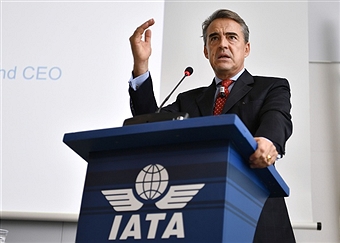Strong indications have emerged showing that the colossal damage being done to global air travel and cargo businesses by hitherto US and China trade crisis cannot equate with the pressure and impacts of COVID-19 on the industry in the last one month and still counting.
Already, the International Air Transport Association (IATA) Monday decried that tough times await global economy as coronavirus disease spread and attendant flight disruptions restrict cargo movement.
In his remarks, IATA’s Director General and Chief Executive Officer (CEO), Alexandre de Juniac, said January marked the tenth consecutive month of year-on-year declines in cargo volumes, as the air cargo industry started the year on a weak footing.
Though he linked January drop to US-China trade tension, IATA boss said when the impacts of the global pandemic is factored into the calculation, the industry be remain in reds for a long time.
According to him, “There was optimism that an easing of US-China trade tensions would give the sector a boost in 2020. But that has been overtaken by the covid-19 outbreak, which has severely disrupted global supply chains, although it did not have a major impact on January’s cargo performance.
“Tough times are ahead. The course of future events is unclear, but this is a sector that has proven its resilience time and again,” de Juniac said.
The association recently estimated financial impact of the novel coronavirus, putting the loss at $113 billion, but there are fresh indications that the global cost may surge as spread deepens.
The new figure was released following a review of financial implication on the public health emergency on the global air transport industry. Just three weeks ago, IATA was expecting lost sales in the range of $30 billion.
The association had said Airlines in Nigeria and other African countries would lose $40 million in revenue this year over flight disruption due to coronavirus spread. The figure is also expected to rise with the spread and new findings and collapse of naira value at the international market because of the mono-product status of the Nigerian economy.









